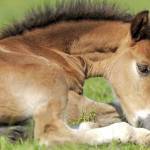Vitamin K Supplementation and Neonatal Foals

Colostrum and vitamin D usually steal the spotlight when discussing the nutritional needs of neonatal foals; however, researchers recently warned horse owners to not undervalue vitamin K.
“Vitamin K plays an important role in blood clotting, and deficiencies in neonatal humans can result in the development of a condition called vitamin K1 deficiency bleeding. This nutrient is also involved in bone metabolism and cell division,” explained Kathleen Crandell, Ph.D., a Kentucky Equine Research(KER) nutritionist.
At present, vitamin K deficiency has not been recognized in horses or foals, and little information pertaining to vitamin K metabolism in neonates is available. Having more information on this topic could therefore be significant, suggested a group of Australian researchers*, especially considering that vitamin K metabolism appears to be quite different in horses than other mammals.
To help fill the research void, the scientists conducted a study to determine if vitamin K is effectively transferred across the placenta to the growing fetus and whether vitamin K supplementation of mare diets before foaling impacts vitamin K levels in milk and, subsequently, the foal.
Eighteen mares in late gestation were divided into one of three groups: no vitamin K supplementation, vitamin K3 supplementation, or supplementation with a proprietary product that is a soluble form of K1 and K2. Mares were supplemented or offered a control vehicle three times weekly, starting 28 days before their estimated foaling date. Milk samples from mares and blood samples from mares and foals were collected before and analyzed for vitamin K levels.
The researchers reported the following:
- No difference in blood vitamin K1 concentrations was noted between mares in different treatment groups;
- Vitamin K milk concentrations were significantly higher in mares supplemented with the soluble vitamin K product than the vitamin K3 supplement;
- A week after foaling, milk vitamin K concentrations had decreased in both groups of supplemented mares to the same level as unsupplemented mares;
- Blood vitamin K levels of foals at birth were undetectable in all three groups; and
- After nursing, vitamin K levels increased in all three groups of foals, but no significant difference was observed.
“In a nutshell, the most important findings were that foals obtained very limited amounts of vitamin K in utero and are dependent on milk to meet their vitamin K needs,” summarized Crandell.
She added, “Ensuring a mare’s diet is nutritionally balanced pre- and post-foaling is essential for optimal mare and foal health. Most commercial concentrates will be fortified with vitamin K, so using a quality feed formulated specifically for pregnant and lactating mares would be advantageous to vitamin K status of the mare and foal.”
*Fischer, T.J., M. Coye, H. Regtop, et al. 2016. Placental transfer of vitamin K in the horse. In: Proceedings of the Australasian Equine Science Symposium. 6:38.








